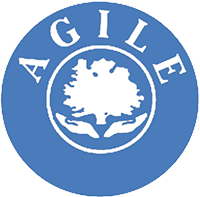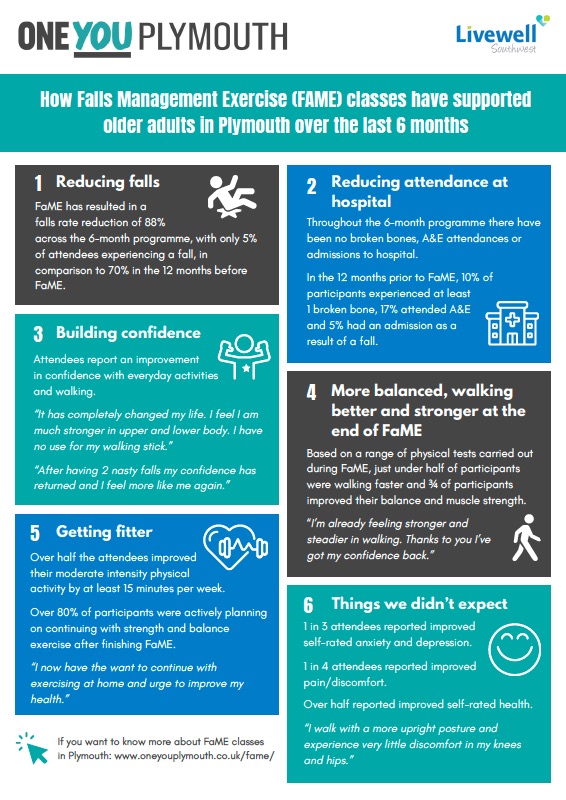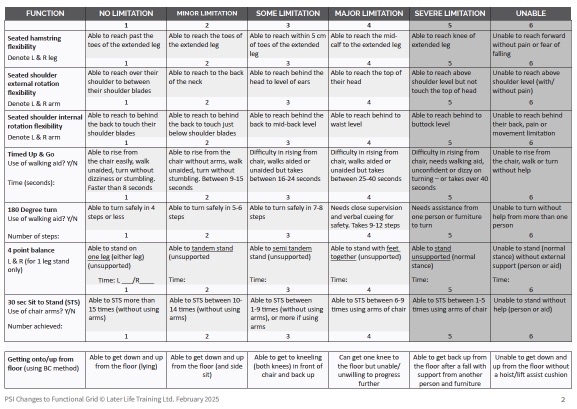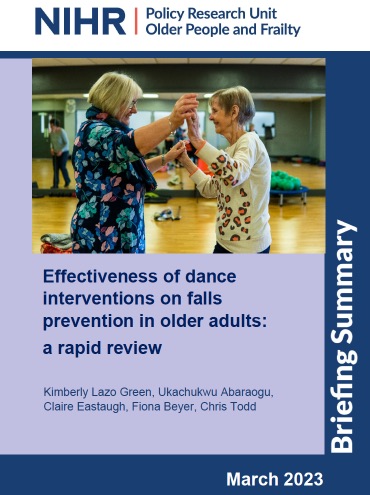FaME as an intervention to reduce falls has been used an exemplar of impact by four separate universities in their REF2021 Impact Case Studies. HEIs were required to submit impact case studies that demonstrate the impacts their research has had beyond academia. The number of impact case studies each submitting unit was required to submit was based on the number of staff within that unit, with a minimum of two impact case studies being required for the smallest units. A total of 6,781 impact case studies were submitted to REF 2021. Impact case studies were assessed against two criteria: reach and significance. To read the Impact Case Studies from all units of assessment and all Universities, click here. Four universities had FaME integral to their impact case studies on falls prevention – Glasgow Caledonian University, The University of Manchester, The University of Nottingham and Manchester Metropolitan University. The relevant sections of the case studies have been given below.

Glasgow Caledonian University REF Impact Case Study – The Falls Management Exercise (FaME) programme, in sedentary older people, reduces the rate of falls and increases physical activity close to recommended levels for health. This led to adoption of FaME by multiple Public Health bodies and widespread implementation across the UK and Norway. FaME halves the number of falls, improves quality of life, physical activity and physical function, reduces fear of falls and produces a return on investment of between £2.89-£50.59 for every £1 invested.
Community led FaME group programmes reach over 10,700 older people per week in the UK. Although FaME was originally developed by Skelton in a small RCT of 100 women with a history of ≧3 falls in the last year (Age Ageing Letter, 2005), it was included in Department of Health guidance (Prevention Package, 2009) and there was some uptake in NHS led outpatient falls programmes (RCP, 2011).
In a problem/solution based model, Skelton, an exercise physiologist, updated the programme (FaME+) with a public health focus that would have wider reach (including more emphasis on progressive strength training, balance challenging exercises, floor work and walking, extra motivational and behaviour change support, and shortened duration). This FaME+ programme has led to collaborations with 10 universities, NHS trusts and local authorities and a technology company, 15 published papers, an implementation manual and shared grant income of nearly £2.8million.
ProAct65+, was a definitive three-arm, parallel-design cluster RCT involving 1256 people aged ≥65 years recruited from 43 general practices in London, Derby and Nottingham with a 2 year follow-up. The 6 month FaME+ intervention, led by Postural Stability Instructors (PSIs) reduced falls (54%) alongside a health-enhancing increase of 105 mins of moderate physical activity a week (1 year post intervention), bringing participants close to the 150 mins/week recommended by the Chief Medical Officer (CMO, 2011). The mean cost per extra person achieving the physical activity target was £1740.
In the UK, 1 in 5 people aged 75+ live with sight loss. Visually impaired older people fall more and are nearly twice as likely to experience a hip fracture than sighted older people. VIOLET, a proof of concept study based in Northumbria and Glasgow, found group-based FaME+ was feasible and safe in people with moderate-severe visual impairment with minor communication delivery changes and in smaller groups. de Jong found that participants and instructors felt that visually impaired older adults could be integrated into existing FaME classes with support.
Working with MIRA Health and the University of Manchester, Skelton, de Jong and Mavroeidi showed that innovative digital solutions (games played on the Kinect platform and a TV using FaME+ exercises) and physiotherapist supervision (for set up and progression) were cost effective, reduced falls (69%), fear of falls and pain in older people living in sheltered housing.
Finally, to provide guidance for commissioners of falls prevention services, the ground breaking PHISICAL Study examined the implementation of FaME+ commissioned in three distinct (organisation, geography, ethnicity, socio-demographics) localities (Derby City, Leicestershire and Rutland Counties) using the Consolidated Framework for Implementation Research and the Carroll conceptual framework for implementation fidelity. PHISICAL followed 29 FaME+ programmes, showing similar reductions in falls and improvements in physical activity seen in ProAct65+ and produced a FaME+ Implementation Toolkit, including advice on areas of fidelity and quality for improvement, to support future large-scale adoption by public health commissioners.
Research and implementation of FaME into practice was recognised in the conferring of Fellowships to Skelton from the Royal College of Physicians of Edinburgh, the Chartered Society of Physiotherapy and a lifetime achievement award from the British Geriatrics Society.
FaME+, designed to reduce falls and improve the health and physical activity of older people, is delivered by PSIs in community settings in the UK. Independently published service evaluations have demonstrated life changing impacts on physical health, physical activity and confidence in those older people accessing FaME+. This has been achieved through a pathway of impact on falls guidelines and policy, the provision of education and implementation materials and demonstrable return on investment for commissioners of these services.
Life-changing health impacts to older people taking part in FaME+ sessions
FAME+ has a significant reach in the UK. An independent ROSPA impact report showed wide implementation and reach in three areas (Devon, Greater Manchester and Leicestershire, Rutland and Derby). A survey of PSIs (n=656, 18% of qualified PSIs) suggested that FaME+ reached 10,729 older adults in an average week and over a one-year period (Jan 2019- Jan 2020) 68,796 people, as sessions run in 12-24 week blocks. Extrapolating to 50% of all trained PSIs and with programmes throughout the year, over 2 million older people a year would be receiving FaME+. The MIRA platform has extended the reach of FaME+ with more than 4904 patients using it since its release, and since 2018 there are over 10 licences specifically for falls prevention in older people used in rehab facilities, care homes and sheltered housing facilities.
Significantly, there have been multiple service evaluations of ‘effectiveness’ by independent community and health organisations demonstrating the physical, mental and social health impacts to FaME+ participants. These include reductions in falls of 43-58%, improvements in balance confidence of 55-100% and quality of life (42%), >10% reduced fear of falling, improvement in timed up and go (20-50%), balance, and functional skills such as getting off the floor, increased self reported physical activity, improved mental wellbeing, and increased social interaction and participation leading to a reduction in social isolation.
Impact on Falls Guidelines and Policy to increase adoption and improve implementation
Due to the efficacy and cost-effectiveness of FaME+, it is one of only two structured exercise programmes supported by PHE Cost-effective Commissioning (2018) for falls prevention. Local providers implement FaME+ as evaluations show a greater return on investment than PHE suggested (£2.28 for every £1) (PHE 2018). Dance to Health reported a return on investment of £2.89 for every £1 invested whereas, Staying Steady (Gateshead) reported that for every £1 spent on FaME+ returned £50.59 to the public purse and Steady Steps (Edinburgh Leisure) estimated that every £1 used on FaME+ saved £18.
In 2019, FaME+’s efficacy led to adoption by the CMO Physical Activity Recommendations for Health, Public Health Wales and the National Prudent Healthcare Falls Prevention Taskforce, The Royal Osteoporosis Society in ‘Strong, Steady, Straight’, the Chartered Society of Physiotherapy ‘Physiotherapy Works – Falls: A Community Approach and Prevention and Management of Falls in the Community: A Framework for Action for Scotland (2014/2016). The Centre for Ageing Better report ‘Raising the bar on strength and balance’ (2019) recommended FaME+ as the best public health programme for prevention of falls and maintenance of physical
function.
Impact on Education to increase adoption and improve implementation
Skelton is a Founding Director of Later Life Training Ltd (LLT), a not for profit national training provider. Since Aug 2014, LLT has trained 1200 PSIs) to use FAME+. The syllabus, informed by Skelton’s research, was updated in 2017 to reflect the verbal and adapted delivery skills required to work with visually impaired older adults; allowing inclusion of people with sight loss into FaME+ classes. In 2016-2018, LLT trained 30 Dance Choreographers in the UK in principles and delivery of FaME+ to support the Dance to Health initiative, reaching a wider audience in public health.
Skelton adapted the FaME+ Implementation Toolkit quality assurance (QA) checklist for PSI self-reflection and assessment to improve quality and fidelity to the delivery of FaME+ and in 2019 LLT provided this to all qualified PSIs. The FaME+ Implementation Toolkit for Commissioners, endorsed by NICE in October 2019, has been downloaded >800 times and 94% found it useful and rated it 4/5 for building the case for investment, planning for implementation and monitoring and evaluation.
Beyond LLT, Skelton, with MIRA Health, delivered a webinar on Exergames based on FaME+ to 200 people and the recording attracted over 350 views. In 2015, she was invited to initiate a strategic rollout of FaME+ by the Norwegian University of Science and Technology, establishing core trainers for the Norwegian National Falls Prevention Programme, Sterk og stødig, (462 instructors trained in 59 Norwegian municipalities), reaching 4000 older people. They now have 75 municipalities (out of 422 across Norway) (Oct 2020) signed up for continued strategic roll-out.

The University of Manchester REF Impact Case Study – Our research at the University of Manchester (UoM), reported in REF2014, reduced the burden of falls in the UK and worldwide. Since REF2014 additional impact includes:
• Falls Management Exercises (FaME) programme is included in Public Health England (PHE), NICE, and US Centers for Disease Control and Prevention (US CDC) guidance.
• PHE estimate FaME provides a societal return on investment of GBP2.28 for every GBP1.00 spent.
• In the UK >1,100 newly trained FaME instructors are delivering interventions.
• In 2019 an estimated 172,000 UK older people did FaME exercises.
• Since 2013, up to 424,554 falls and up to 21,000 fractures have been prevented in the UK.
• FaME has been implemented as part of an exergame (fitness video game) for digital delivery.
• >260,000 booklets which include FaME exercises have been distributed during COVID-19 lockdowns in 2020, recognised as best practice by WHO.
We worked with PHE and the Royal Society for the Prevention of Accidents (RoSPA) to influence policy and practice, including recommendations for use of FaME, FES-I, and positively framed messages [Bi]. Similar work was undertaken with the Centre for Ageing Better, AgeUK, British Geriatrics Society and national and international guideline development bodies (e.g NICE, US CDC).
The FaME Implementation Toolkit (developed by East Midlands CLAHRC (Collaboration for Leadership in Applied Health Research and Care), endorsed by NICE and downloaded >800 times) facilitates commissioners’ and providers’ uptake.
We worked with Greater Manchester Combined Authority on the devolved falls, fractures and frailty strategies and influenced service configuration, use of FaME and the positively framed “Taking Charge” falls prevention programme. During 2020 COVID-19 lockdowns, we helped develop Keeping Well at Home and Keeping Well this Winter booklets including FaME exercises, distributed to >260,000 people and recognised as best practice by WHO.
FaME has been shown to have a financial impact, with PHE recommending the programme as a cost-effective intervention to reduce falls, estimating that FaME provides a societal return on investment for every GBP1.00 spent of GBP2.28 (1:2.28 ratio), although other estimates are much higher (1:18 and 1:50.5).
FaME has also been shown to be income-generating. There are 3,264 qualified FaME instructors in the UK (up from 2,000 reported in REF2014), enabling more people to participate in FaME classes, generating GBP813,837 income for Later Life Training, a not for profit training organisation.
Interim data from a survey undertaken for PHE reveals that 80% of responding falls services in England provided FaME to up to 300 participants per week during 2019-20.
In terms of patient outcomes, some 172,000 people in the UK received the FaME programme in 2019, suggesting that during 2014-2020, up to 424,554 falls and up to 21,000 fractures have been averted by participation in FaME. The Centre for Ageing Better present strong testimonial videos demonstrating FaME’s effect on individuals, along with case studies of FaME implementation in the UK.
FaME-based exercises have been implemented in exergames, providing a new cost-effective pathway to impact. The UK company MIRA-Exergaming indicates that approximately 5,000 patients in >200 clinics worldwide have used the games in >67,000 sessions.
The COVID-19 pandemic has given further impetus to our work because of risk of deconditioning and falls resulting from lockdown. Policy briefings to the Department of Health and Social Care on virtual delivery exercise regimens including FaME have been downloaded >1,100 times.

The University of Nottingham REF Impact Case Study – Between 2015 and 2018 Logan and colleagues at the University of Nottingham with East Midlands NHS and Local Government investigated the implementation of the evidence based Falls Management Exercise (FaME) programme in a range of settings through the ‘PHysical activity Implementation Study In Community-dwelling AduLts’ (PHISICAL) study. 361 people took part in 29 FaME programmes. 41% of participants completed at least three-quarters of the classes and significant improvements were seen in mobility, measured with Timed Up and Go and the Falls Efficacy Scale (both p<0.001), and muscle strength and balance increased by 55%. These results confirmed the benefits of the FaME programme in real-world settings. Our free online and downloadable resources for commissioners to use to plan, implement and monitor the Falls Management Exercise (FaME) programme following our PHISICAL study have been downloaded 884 times (between June 2019 and May 2020). NICE endorsement of the Toolkit (October 2019) acknowledges its accurate reflection of the NICE falls guideline and quality standard. Two counties in England have commissioned the programme enabling over 1,500 people access to effective falls prevention intervention.

Manchester Metropolitan University REF Impact Case Study – Locally, our research influenced Stockport Clinical Commissioning Group to implement a ‘falls prevention’ programme that has delivered measurable reductions in falls risk among targeted older people, and improved the borough’s national performance rankings for falls. In its Joint Strategic Needs Analysis (JSNA) in 2016, Stockport Clinical Commissioning Group (CCG) found there were 2,748 injuries from falls in the over 65 each year. The borough was in the worst performance quartile nationally for injuries from falls in older people, and falls prevention was thus adopted as a public health priority. Drawing again on McPhee’s research evidence and expertise, the local CCG established Steady in Stockport, a holistic service for falls and fracture prevention, and bone health improvement. Between November 2017 and April 2019, Steady in Stockport helped 2,670 residents (11.94% of 22,360 people aged over 65 with frailty). Stockport CCG Commissioning Lead for Community Services says, “we know we are reaching a significant proportion of people at risk of falling and injury”. The JSNA 2020 analysis shows a significant 22% drop in emergency transportation for fall injuries since the launch of Steady in Stockport (205 to 159 conveyances per month). Latest NHS data show that injuries from falls in residents aged over 65 have decreased to 2,313 per year. Stockport is no longer in the worst performing quartile for this indicator. The total economic cost savings to the local NHS Trust from this service are estimated at GBP2,400,000 within five years of launch. Stockport worked with its leisure services provider to create Stay Steady [*based on FaME and delivered by PSIs, note added by LLT], a community-based falls prevention class. In 2018-19, 297 residents participated; they had had an average of 2.5 falls during the 12 months prior to the course. Physical performance testing showed most participants improved, typically lowering their falls risk from ‘high-to-moderate’ to ‘moderate’. The majority of completers self-reported increased confidence in performing everyday activities without losing their balance, showing a significant improvement in their quality of later life, and a 20%-40% reduction in falls risk according to NICE guidance.







